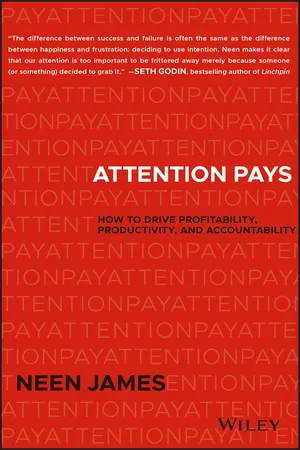
- English
- ePUB (mobile friendly)
- Available on iOS & Android
About This Book
Drive profitability, productivity, and accountability
To create extraordinary lives, we must learn to "unplug" from the constant barrage of disruptions and "plug in" to the tools, strategies, and mindsets that allow us to harness our attention to reach our highest potential—and this book shows you how.
Attention Pays spotlights on the power of attention and absolute focus. Personally: WHO we pay attention to. Professionally: WHAT we pay attention to. And Globally: HOW we pay attention in the world—and to the world. In an on-demand, 24/7 society, where distractions cost millions of people productivity, profitability, relationships and peace, it's time to pay attention to what matters most.
• Includes powerful tips and tricks increase profitability
• Shows you how to achieve maximum accountability and results
• Provides strategies to help you productively manage daily tasks
• Offers guidance on improving your daily attention and focus
If you're ready drive profitably, increase productivity and boost accountability, it's time to tune out the noise, focus on what really matters and learn how Attention Pays.
Frequently asked questions
PART ONE
Does Your Attention Pay?
CHAPTER 1
Our Attention‐Deficit Society
- Nine people die every day and 1,153 people are injured because of distracted driving. These are not just nameless, faceless people. These are partners, mothers, fathers, children, siblings, and friends. Possibly yours.
- The death count of pedestrians in Minneapolis, Minnesota, is steadily rising due to distracted walking. They have a light rail system, and people are so absorbed with their cell phones they don't even see a train coming at them!
- According to a study by the Information Overload Group, $588 billion is lost every year in U.S. businesses alone because of interruptions.
- In a study of 2,000 respondents, Think Money found a total of 759 hours (that's 31 days!) in lost time every year due to distractions.
- Since the year 1900, about 477 different species have become extinct because of our inattention to our environment and the destruction of natural habitats.
- The Global Nonrenewable Natural Resource Scarcity Assessment found that 23 of the 26 (88%) nonrenewable natural resources it analyzed will likely experience permanent global supply shortfalls by the year 2030.
INTERNAL FACTORS
The Great Multitasking Myth
The “Over Trilogy”—Overwhelmed, Overstressed, and Overtired
Table of contents
- Cover
- Table of Contents
- About the Author
- Introduction
- PART ONE: Does Your Attention Pay?
- PART TWO: Personally—Be Thoughtful
- PART THREE: Professionally—Be Productive
- PART FOUR: Globally—Be Responsible
- Bonus Chapter: Build an Organization That Pays Attention
- Index
- End User License Agreement